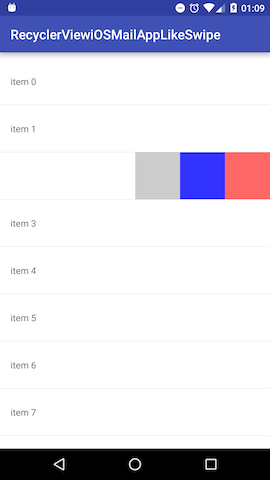ScrollableList
Learn how to efficiently display a list of text in a RecyclerView and understand its architecture.
activity_main
- RecyclerView widget helps you display a list of data.
- RecyclerView comes with built in LayoutManagers. RecyclerView delegates how items are laid out to LayoutManagers.
<?xml version="1.0" encoding="utf-8"?>
<FrameLayout xmlns:android="http://schemas.android.com/apk/res/android"
xmlns:app="http://schemas.android.com/apk/res-auto"
xmlns:tools="http://schemas.android.com/tools"
android:layout_width="match_parent"
android:layout_height="match_parent"
tools:context=".MainActivity">
<androidx.recyclerview.widget.RecyclerView
android:id="@+id/recycler_view"
android:layout_width="match_parent"
android:layout_height="match_parent"
android:scrollbars="vertical"
app:layoutManager="LinearLayoutManager"
/>
</FrameLayout>
list_item
- Use the Material Components for Android library to have your app more easily follow the recommended Material Design guidelines.
- Use MaterialCardView to display content in a Material card.
<?xml version="1.0" encoding="utf-8"?>
<com.google.android.material.card.MaterialCardView xmlns:android="http://schemas.android.com/apk/res/android"
android:layout_width="match_parent"
android:layout_height="wrap_content"
android:layout_margin="8dp">
<LinearLayout xmlns:android="http://schemas.android.com/apk/res/android"
android:layout_width="match_parent"
android:layout_height="wrap_content"
android:orientation="vertical">
<ImageView
android:layout_width="match_parent"
android:layout_height="194dp"
android:id="@+id/item_image"
android:importantForAccessibility="no"
android:scaleType="centerCrop" />
<TextView
android:id="@+id/item_title"
android:layout_width="wrap_content"
android:layout_height="wrap_content"
android:padding="16dp"
android:textAppearance="?attr/textAppearanceHeadline6" />
</LinearLayout>
</com.google.android.material.card.MaterialCardView>
Model
- Use resource annotations to help ensure that the right type of resource ID is passed into a class constructor.
data class Affirmation(
@StringRes val stringResourceId: Int,
@DrawableRes val imageResourceId: Int
)
Datasource
class Datasource {
fun loadAffirmations(): List<Affirmation> {
return listOf<Affirmation>(
Affirmation(R.string.affirmation1, R.drawable.image1),
Affirmation(R.string.affirmation2, R.drawable.image2),
Affirmation(R.string.affirmation3, R.drawable.image3),
Affirmation(R.string.affirmation4, R.drawable.image4),
Affirmation(R.string.affirmation5, R.drawable.image5),
Affirmation(R.string.affirmation6, R.drawable.image6),
Affirmation(R.string.affirmation7, R.drawable.image7),
Affirmation(R.string.affirmation8, R.drawable.image8),
Affirmation(R.string.affirmation9, R.drawable.image9),
Affirmation(R.string.affirmation10, R.drawable.image10),
)
}
To implement the adapter
RecyclerView uses the adapter pattern to adapt and display the data.
ViewHolder creates and holds the views for RecyclerView.
- Create a custom ViewHolder class that represents a single list item view. Extend from RecyclerView.ViewHolder class.
- Modify the ItemAdapter class to extend from the RecyclerView.Adapter class with the custom ViewHolder class.
- Implement these methods within the adapter: getItemsCount(), onCreateViewHolder(), and onBindViewHolder().
class ItemAdapter(
private val context: Context,
private val dataset: List<Affirmation>
) : RecyclerView.Adapter<ItemAdapter.ItemViewHolder>() {
class ItemViewHolder(private val view: View) : RecyclerView.ViewHolder(view) {
val textView: TextView = view.findViewById(R.id.item_title)
val imageView: ImageView = view.findViewById(R.id.item_image)
}
override fun onCreateViewHolder(parent: ViewGroup, viewType: Int): ItemViewHolder {
val adapterLayout = LayoutInflater.from(parent.context)
.inflate(R.layout.list_item, parent, false)
return ItemViewHolder(adapterLayout)
}
override fun onBindViewHolder(holder: ItemViewHolder, position: Int) {
val item = dataset[position]
holder.textView.text = context.resources.getString(item.stringResourceId)
holder.imageView.setImageResource(item.imageResourceId)
}
override fun getItemCount(): Int {
return dataset.size
}
}



